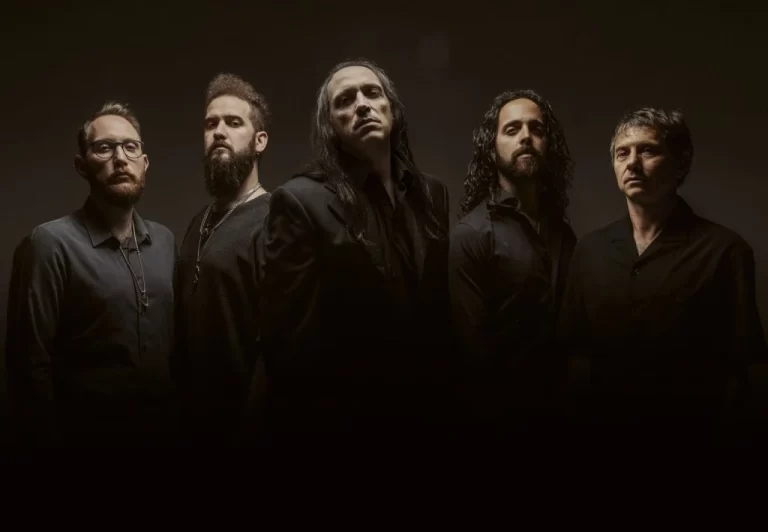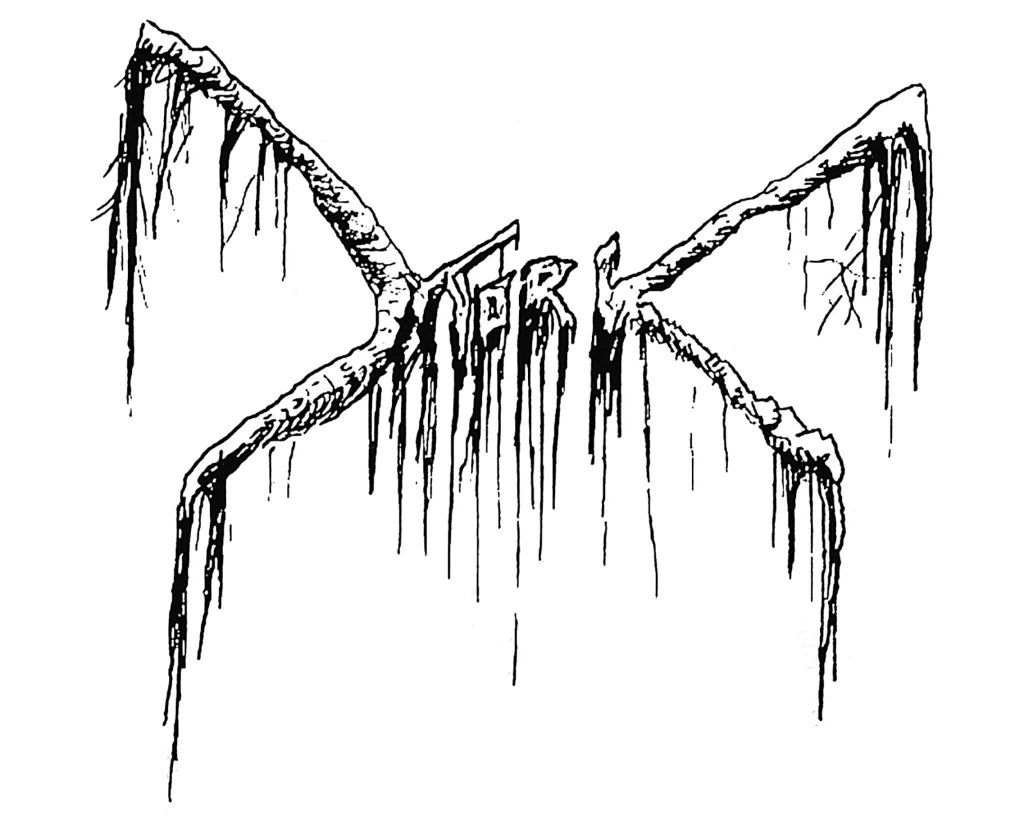
When you spend time reading or listening to interviews with Fenriz of Darkthrone, you get the sense of a wild-eyed music fan who has never lost that all-encompassing love of music that caused him to pick up an instrument in the first place. It is a rare quality, and few artists retain that magical sense in the face of a music business that seems custom designed to inspire ennui in those most connected to it.
It is a quality, however, that Thomas Eriksen of Mork possesses in abundance. Joining me over video link, from the first moment he appears on screen, he offers none of the clinical detachment so often found in band members (especially as their career progresses), exuding instead both a love of music and the willpower necessary to drive a solo career forward. Over the course of our discussion, we cover a lot of ground – art, lyrics, composition and live work – and always there’s an energy to Thomas’ answers that is incredibly compelling. Reading it back, you can feel the enthusiasm for the form that has allowed Mork to grow organically over the course of six albums, from the dark side project as which it began in 2004 to the increasingly respected and revered act that it is today.
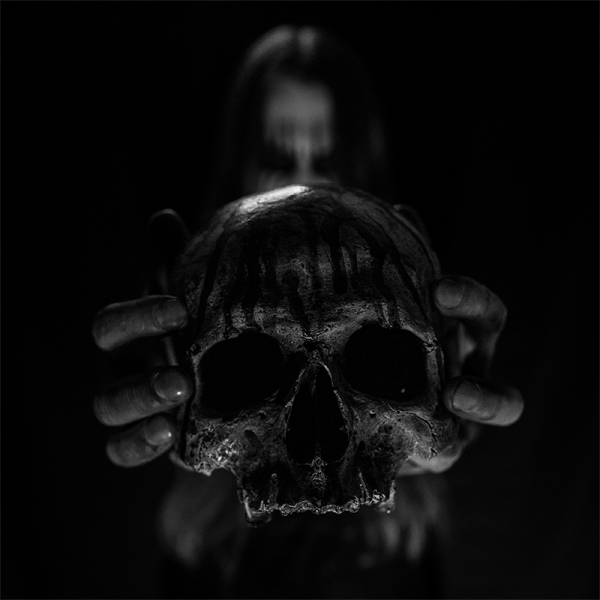
How are you doing?
I’m fine thanks. I have survived the first weekend of release!
I assume you have a lot of interviews to do at the moment.
Yeah, there’s plenty, there’s plenty – but there’s always room for one more, you know?
Well, thank you very much indeed for coming on – to start with, you’ve spoken before in quite a few interviews about how, when you started out, you had the mindset to stick fairly close to the traditional black metal template, albeit finding your own voice within that – but, with each subsequent album, you’ve been progressing further each time, so I was thinking, in terms of black metal and how people perceive it to be, do you find one of the more inspirational things is one of the ways it is quite a fluid genre and more about feeling than a specific sound?
Absolutely, and that is basically what drives me these days. It’s feeling. That’s the easy way to put it basically. As you just mentioned, I have been evolving the last albums and what I’ve been doing, actually, is just getting rid of the expectations around traditional black metal and Norwegian metal and all that “trve” rubbish, you know? I have decided that Mork has become its own voice now and what comes to me in the moment is what is real and true for me, if you know what I mean. If a riff or a feel or a lyric just comes to me, then that is something I am supposed to feel. And there you have it, the latest album is probably one of the most honest albums I have ever done, I think.
I don’t know, it seems like… I can only judge by the feedback I’m getting, you know, and I’ve been blown away to be honest with you. I did not expect the feedback to be as good as it has been on Friday and the days after. It’s been top ratings everywhere. The fans are writing to me and just blowing a lot of smoke up my ass! Obviously I am thankful that the album is getting well treated and a good reception, but the funny thing is that the days prior to release, from the point where I mastered the album and finally delivered it to Peaceville, and it left my hands so to speak, I have been almost a nervous wreck, because I had been feeling that it was probably me stepping too far from expectations. So, I thought it was probably my last Mork album; I would be dropped form my record contract; all the fans would turn their backs on me [laughs] but, for some reason, it has worked really well this time.
Obviously, it’s interesting how you put that, because when you’re in a band, there’s an element of mutual reinforcement and you can support each other, but as a solo artist, when you put your record out there, it’s quite isolating because you have no idea how people will receive it and it’s all on you. I know that you have said many times that you write the music primarily for yourself, but nevertheless, when it leaves you and it goes to the label, it’s quite a vulnerable moment for any artist.
It is. Like I told you, I’m not trying to measure dick sizes with any other black metal bands either. I just do what I do, you know, and that’s the most honest that I can get. So, it’s all on me. If I fail, I fail miserably and if I succeed, I succeed and I get to take the credit for it [laughs].
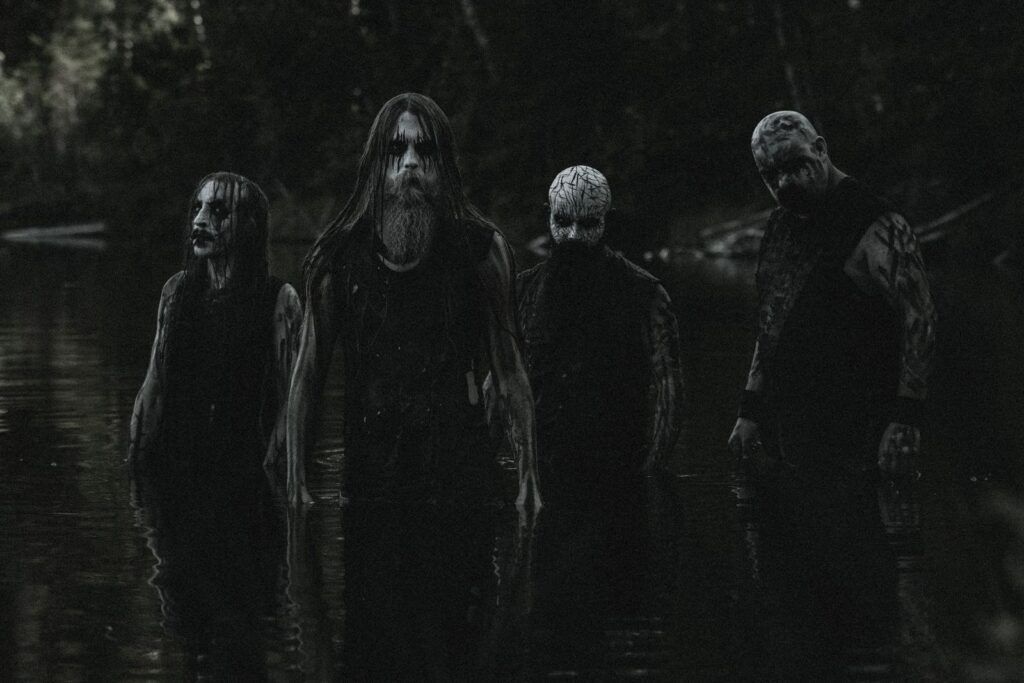
You’ve talked a lot about how you come from a background that’s more old school rock and punk, particularly, and that was the common thread for me. I went from alt rock to punk and then I got really interested in black metal – and what worked for me is that, like punk, you can sort of distil a sound and say “that’s punk” or “that’s black metal”, but to do that is reductive and completely ignores the variety that exists within the genre leaders – you know, the sex pistols sound nothing like the clash, for example – and, for me, that’s the connecting thread. Is that how you see it?
I’ve never thought about it this way, but when you say it, I suppose you’re right. Because, if you go back to the way early bands that were almost not black metal, like Venom, Bathory, Celtic Frost and, what the fuck do you have out there, Sarcofago from Brazil, or whatever. These bands all sound different and if you go into what became black metal – the Norwegian one – you have Mayhem, Darkthrone, Burzum and, a bit later, Satyricon and some Dimmu Borgir stuff and they all differ from each other. So, I totally agree with you and I just hope that I differ from the rest of them, you know? I feel that maybe I have my own sound. Everything I touch will automatically sound like me. I don’t know, I think that it’s something most artists are striving for, I suppose. There’s many copycats out there that just make Transylvanian Hunger over and over, time after time. But, it’s important to listen to your own voice. Don’t shush it down if it scares you a bit because it’s maybe a bit naked and different. I suppose that’s what I’ve been doing, you know, that’s what the guys did back in the day, I suppose.
I think it’s the difference between being a fan of music and lots of different types of genres versus growing up being a fan of just one type of music which, almost inevitably will lead you to just sound that one way. If you come from all those perspectives, you’re going to sound more like you than just a pastiche.
Absolutely man. If you listen to the new album, there are a lot of melodies in there. There’s some slower paced stuff, there are a couple of tracks with blast beats. There’s a whole bunch of variety and that is important to me. I haven’t mentioned this to anyone, actually, before I talked to you now, but there are a couple of guitar licks on the new album that… The song Forfort Av Kulden (the latest music video): when you have the long Burzum portion of the song (the atmospheric part), in there there’s a guitar lick, a kind of lead type of thing, and that is actually, I suppose, the vibe and the feel and the atmosphere which is something I carry with me from listening to Royksopp many years ago.
Wow!
They had this electronic way of doing atmosphere and they had a lot of genius stuff, and I suppose some of that can spill out in some way in a song. That’s the important thing. If I just wanted to be Darkthrone, it wouldn’t ever sound like this.
I like the fact that you slow down a little bit on this album, because that dynamic and sense of atmosphere – you can get that with the raging guitars, but when you slow it down, it lets things breathe a bit and it almost sounds heavier when it’s slower and has that grind to it.
Absolutely, I totally agree with you. I am a mid-paced guy. I can sit down with the idea that I’m going to write a fast song, and I always start out fast and then it slows down. I always craft some groove into it. I’m not physically able to just make fast music. I think there’s something just repellent inside me. I can’t do it! Even though I’ve been trying a couple of times. Like: “Mork is way too mid-paced now, I need to speed things up!” I remember when we went on a tour in December a couple of years ago, a Scandinavian run and we played somewhere in Sweden and I remember that, in between a couple of songs, some asshole in the crowd was shouting “mate, play something fast! Play something faster, come on!” There are some stereotypical black metal fans out there that just want it to be fast. I can’t help it. I want it to be real and I want to feel like a pulse, if you know what I mean. I don’t know, I think I went around your question there, but I just keep on blabbering [laughs].
That’s it, when you think about atmospheric music, whether it be black metal or progressive or electronica – and you can create an atmosphere with almost any element, but it can be hard to maintain it over a period of time, so it’s interesting hearing that there’s that expectation of speed, that sometimes you feel as well, and then coming back to your own voice within it.
Absolutely. I range from everything from Black Sabbath to Pink Floyd, and I just mentioned Royksopp, and obviously I’m into black metal as well. I’m head over heels in love with Burzum and Darkthrone and I will probably always be and I will probably never check out the other black metal bands because those two bands provided those building blocks in me that I needed and if I ever want to feel that needle of atmosphere that those bands produced, then I will just put on Filosfum or Under A Funeral Moon, you know what I mean? I don’t need all the other stuff. I’m a bit narrow like that. It’s just how I am.
I think it’s more interesting to explore and to go off on a tangent. If you find that atmosphere and that thing that works for you… I’m a bit of a musical archaeologist – I’d rather look at the influences, for example, and find out what they were digging when they were writing and explore different sounds that way.
Yeah, I have done that too, obviously, I’ve gone back and seen what came before and that sent me back to Venom and Bathory and stuff like that. And that stuff is magical in itself, but it’s different. It is not the same. You don’t get that Norwegian Wood vibe form listening to Celtic Frost. But, you understand where the guys got it from. And the funny thing is that everything goes back to Motorhead. Motorhead and punk rock. that is what shaped the early black metal stuff that led on to the black metal we have today. So, cheers to Lemmy! That’s all I can say, you know [laughs].
So, in terms of writing, do you set aside a period to get the new album done, or are you always noting bits and pieces down and then, when it’s time to actually do an album, you are drawing from those?
I suppose, maybe since the second or third album, I’ve been making half the album and then starting something new on the side, so they kind of intertwine, you know. I usually sit down and, for example now, I have about forty new songs just lying there that I’m working on for the next album. So, I’m constantly working. There’s not a period when I just focus on it – it could be anywhere, or any time.
My thing is that I usually sit around with my guitar unplugged and I just figure out something that’s cool, then record it on my phone, and just call it Mork 2 or 3 or whatever. And then, it’s usually the case that, when I have time, I’ll go to the studio to record a song. Then, I’ll figure out which riff I want to use and then usually the song is written in one sitting. That’s the way I do my, let’s call It magic. That way, it’s spontaneous – just doing the whole thing in one shebang. Usually that’s the song. A few times, maybe, I can bleed over maybe three nights or something, but usually it doesn’t take a lot of time. I do it spontaneously, so it feels, I don’t know, it feels a bit more fluent, in a way, if that makes sense.
I’m not the kind of person, like say… I would say, like Metallica. I envision that those guys are working on songs for a long time! You know what I mean? I couldn’t do that ever. I think that I don’t have enough patience in my life, I think [laughs]
So, does the music come first and you then start working on lyrics, or the two kind of go hand and hand, with the lyrics forming around the music as it’s being written.
Most of the time, I write the lyrics as poems separately. But, also, if I have a few finished musical tracks, I will listen to them and get a sense of what they remind me of – the feelings, vibes, words, topics and then, sometimes, I come up with titles that fit the music and maybe write the lyric around that. So, it differs a bit, but mostly the ideas are poems.
I actually have an idea, or dream, of releasing a book with my lyrics. I would love to do that.
If you did that with a collection of the artwork that goes hand in hand with the albums, that would be amazing!
Exactly! Exactly. That’s my idea – and the thing then would be to go to David, with whom I’ve been working for years, and have him do original pieces per song, I just can see how expensive a fucking book we’d make [laughs] So, maybe it’ll just remain a dream. Let’s see what happens.
It’s a cool idea. Not many people do stuff like that, but Michael Gira of Swans has done fundraising for his albums, where he makes books with personal, hand drawn, hand-blocked artwork and they’re amazing pieces to have – I love that physicality, and it really adds something to the music.
Yep, I totally agree with you. Absolutely.
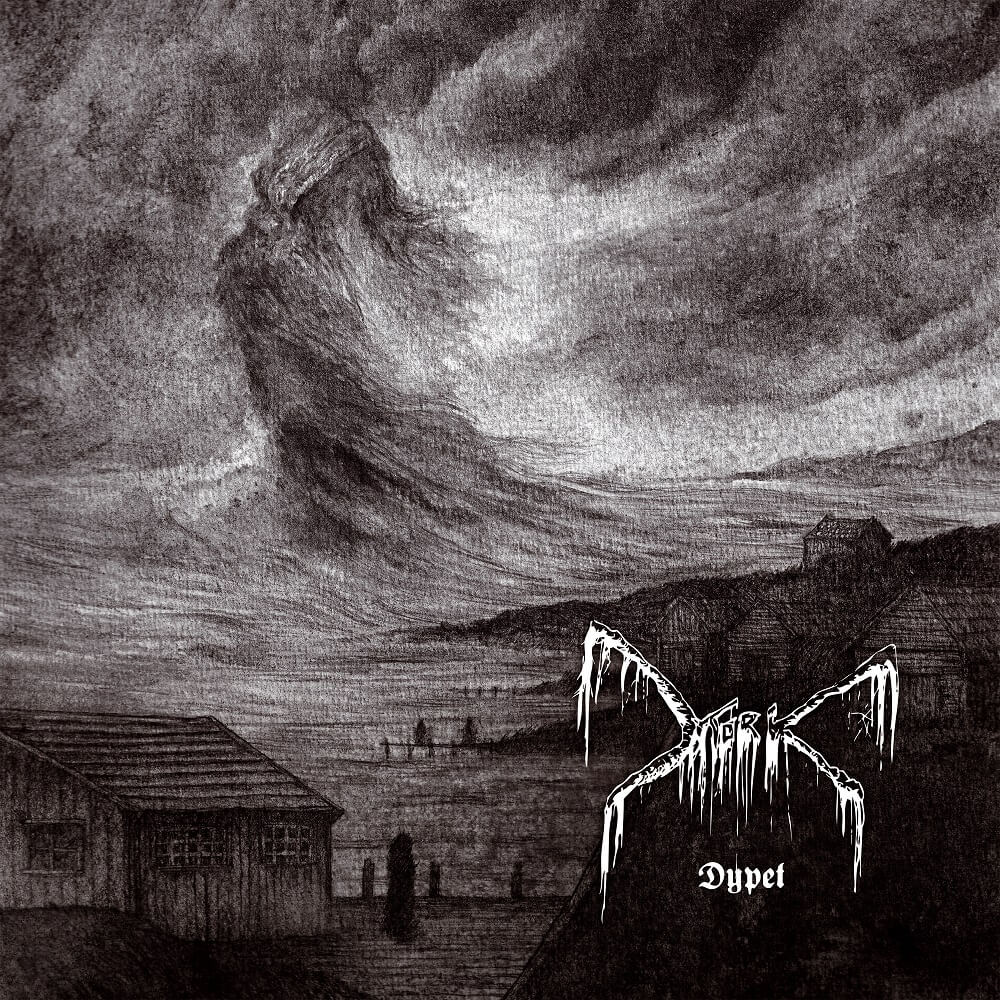
In terms of working with David Thierre, obviously he’s an amazing artist and he’s given your albums something that really enhances the atmosphere. When you speak with him, do you have an idea of what you want, or do you play him the music and leave him to find his way? How do you engage with him to get the cover as you want it?
Truthfully, every time I have worked with David, I have a vision that I want him to realise. So, I basically tell him what I’m after and then he does his thing. I mentioned this to a couple of other interviewers lately, that funnily enough, when I look at David’s pieces that he does on his own or for other artists, they really differ from what he does for me. I think his work for Mork is something that separates itself a bit from his other stuff, and I think that’s fascinating to be honest. I don’t know if only I can see that, or want to see that, but it seems like it. It’s a little bit of that less-is-more approach, I suppose. The first piece he did for me was Det Svarte Juv which was this huge gorge out in the middle of some desolate place with this little, feeble dude crawling towards the edge. Then there’s the Katedralen one, which is just a D&D cathedral. I don’t know, I think it’s genius what he does. He’s a really talented artist and I’m pretty sure I will use him next time around, too. I think so.
It’s interesting – I think the collaborative relationship between an artist and a musical artist is really important and I wonder if… I’ve spoken to a number of bands who aren’t that bothered, and who are happy to let the artists just do their thing, so guess the artist just defaults to what they know. When you have a vision, and you challenge each other, that’s when you get something special and that’s probably a large part of it.
The other things is that this is a solo band, it’s only me. I am an only child, I am an egotist and I have such a pride and I have visions for everything that I do with Mork and it’s important to me that everything is right. The packaging – everything. So, I’m sorry that most artists are like that because, like you said, there’s a lot of run-of-the-mill, standard cover art out there which, to me, is just cheap in a way. Not to take away from the artists in question, but it’s a piece of art and it’s a piece of me that I’m putting out there, so I need to enjoy going all in. But I won’t use more than three nights on a song! [Laughs]
I really like that approach and I think that it’s something that, as a fan and a listener, you do feel it when a band puts something of themselves into everything that makes it what it is. Black metal, in particular, is a very artistic medium, so it means a lot when someone takes that time and trouble.
Yep, hopefully the listener can catch up on that and feel the authenticity. Yeah.
This goes back to the idea of being a one man band – because it is challenging and you can, sometimes, go down that rabbit hole of self-exploration. Is there anyone who is a trusted pair of ears to help offer an outside perspective, or do you keep it completely to yourself?
Mostly to me, to be honest. But I am always a bit curious as to what people think, so I tend to show my band mates ideas and rough mixes that I’m working on. If we’re driving somewhere on tour, or whatever, I usually show them stuff, just to take the temperature, really. But, it’s the same as I’m asking my fiancé, who I live with – she doesn’t give a fuck about my rough mixes [laughs] I’m like “what do you think about this riff?!” and she’s like “I don’t know!” Most of the time, the band guys don’t even know because they need to hear the finished song with the vocals. It’s hard, but I have to trust myself at the end of the day.
I find, once I start with something, I’ve got no clue where it’ll go, but once I have a few elements down, my brain fills in all the bits and I have to get the energy to try and finish it – do you arrange things in your mind before you get near the final mixes?
Nope, I start off with the riff and then I just use my creativity there and then. I just come up with each part like this. Sometimes you know if a riff should be repeated somewhere. That’s something that just calls to you. A funny thing about song writing that I actually got from John Fogerty from Creedence – I read his autobiography a couple of years ago – and he said that he is born with a bell that goes off in his head. It’s like [imitates bell sound] and he can tell if it’s a good idea or hook, or whatever. If you stop listening to that bell, it may never ring for you again. He said that, or words to that effect, and I think that rings true for every song writer, you have to trust your instincts, and that’s the funny thing – I mentioned the song already, Forfort Av Kulden – this latest music video I told you about; the song structure there may be a bit strange. It has this really upbeat, really simple beginning and then it just goes over to this long atmospheric slow part. No refrains, no choruses, no bridges – just this long fucking portion of the song and then it ends with the start riff again. The reason it turned out like that is because it felt right. If I would have been walking around composing it in my head, it would probably be less. I don’t know.
In many interviews, you’ve refused to be drawn too much on your lyrics and I like that stance – I think being oblique about the meaning adds to the music – so, in your view, is it about leaving it up to the listener to create their own interpretation?
A bit cliched, perhaps, when it comes to this because I’m like a poet. A poet shouldn’t explain his poem to you. And that’s the important thing for me, that I’ve picked up on over the years. Just going back to myself exploring black metal and reading Burzum lyrics, you know, the Norwegian Burzum lyrics back in the day, and I was getting truckloads of feeling and emotion from that and it was mysterious because I have no fucking clue about where he comes from or why he wrote those words in that way. And that is something I fell in love with. And that’s also why I decided to do this in Norwegian always. I am capable of writing English lyrics, trust me, but I would never get the feeling that I get out of what I call my Norwegian poems. It’s something special for me, at least.
I like the idea of allowing the listener to create their own interpretation. People love to have stuff explained – whether it’s movies or books, they want prequels. I think you lose a lot through that over-explanation of everything. I think you gain a lot more from music that you have to work at or bring yourself to a little bit.
There are a couple of Darkthrone songs in Norwegian that I’ve been wanting to ask about for years and I know the guys. Anytime I could just pick up the phone and call one of them and ask them “what is that song about, what are the lyrics about – tell me something more!” But, if I did that, I would ruin the magic that I feel about the song. So, sometimes, you just have to respect the magic, man! Most people are spoiled brats by today’s standards with their internet and everything is available all the time. So, I for one want to at least try to maintain and keep some of that magic in the world [Laughs]. For what it’s worth.
I just have one last question for you: Mork seems to be growing, and very organically, which I think is wonderful – and I know your live performances up to now have, generally speaking, been quite few and far between, but I get the impression you want to tour quite a bit more, is that right?
Yeah, I would love to. The problem I have is that I don’t have any booking agent actively looking for shows. Usually now, we are just approached to do shows and then we do some shows. But, if I had one manager who could go out there and work, then I am sure we could be playing way more, you know. As it is today, that’s not the case. So, we do have some shows: We’re playing our first show in a little club here in Norway, in a little club, which will be amazing because it will be really intimate – 160 people and, I think Nocturno Culto will be in the crowd, because he doesn’t live that far from there and it will be nice to see him again. I try to get him on stage, you know, but he’s a tricky customer. He has two songs with me now, so there are no excuses really [laughs]. We’re doing Inferno festival (I’m really looking forward to that, it’s the third time and it’s usually a great experience). Then we’re going to Berlin for the first time in April, playing something called Walpurgisnacht. Then, we’re doing In Flammen in July; Brutal Assault in Czech in August and then we’re working on a big, big, big, big tour in October, but that’s not finalised yet. I’m sorry to say it does not touch our part of the world it’s in totally a different place – more exotic if you like. I’m really looking forward to announcing that. Something is happening, you know, but you need to help me get some gigs in the UK – we have to come back! Tell your fucking friends to book us!
Ah man, every review I’ve seen – every piece about Mork is saying the same thing. I’m sure there will be a groundswell and the invites will come soon enough.
Ah man, let’s hope so – I feel like a bitch just bitching about this, but hey! I love to travel, I love to play my shit and I love to see the people! That’s just how it’s become. It’s a part of life. I don’t know – just to travel in itself is magical. We went to South America recently, and who can say that? And these fucking insane people standing in the front row who only know Portuguese or Spanish, uttering your lyrics in their own way of course, but that’s a special feeling man!
Dypet, Mork’s sixth album, is available now via Peaceville Records. You can read our full review here.


